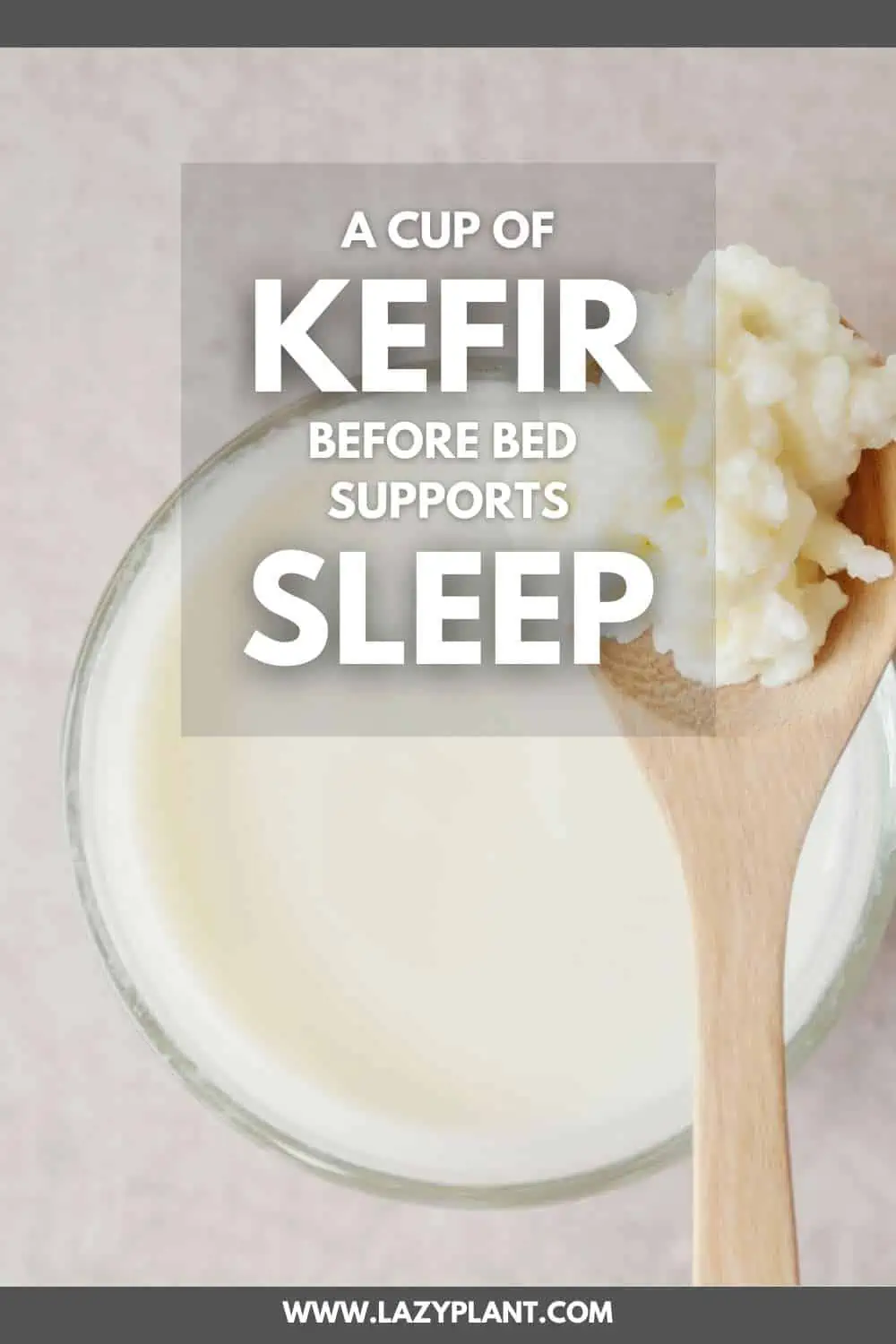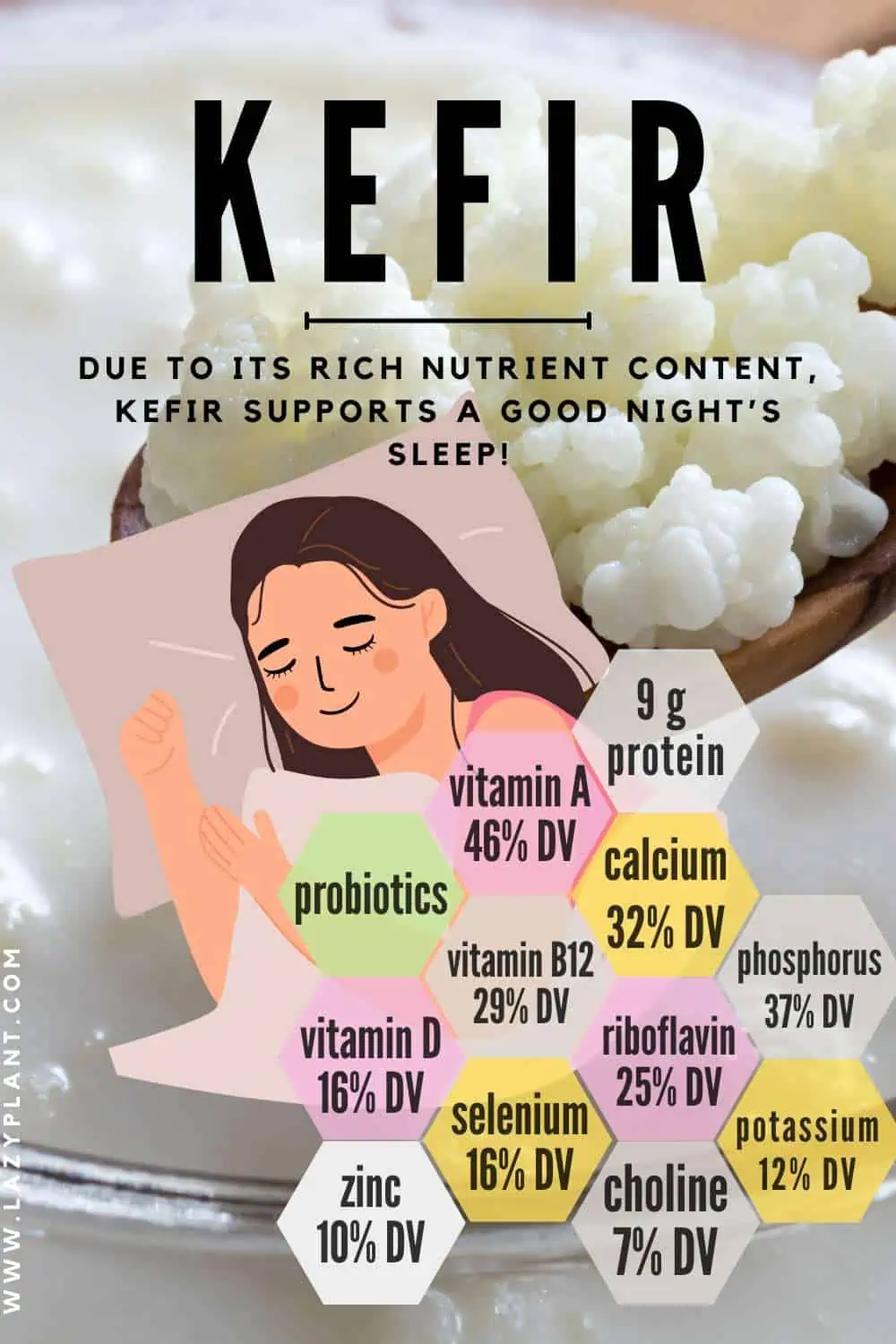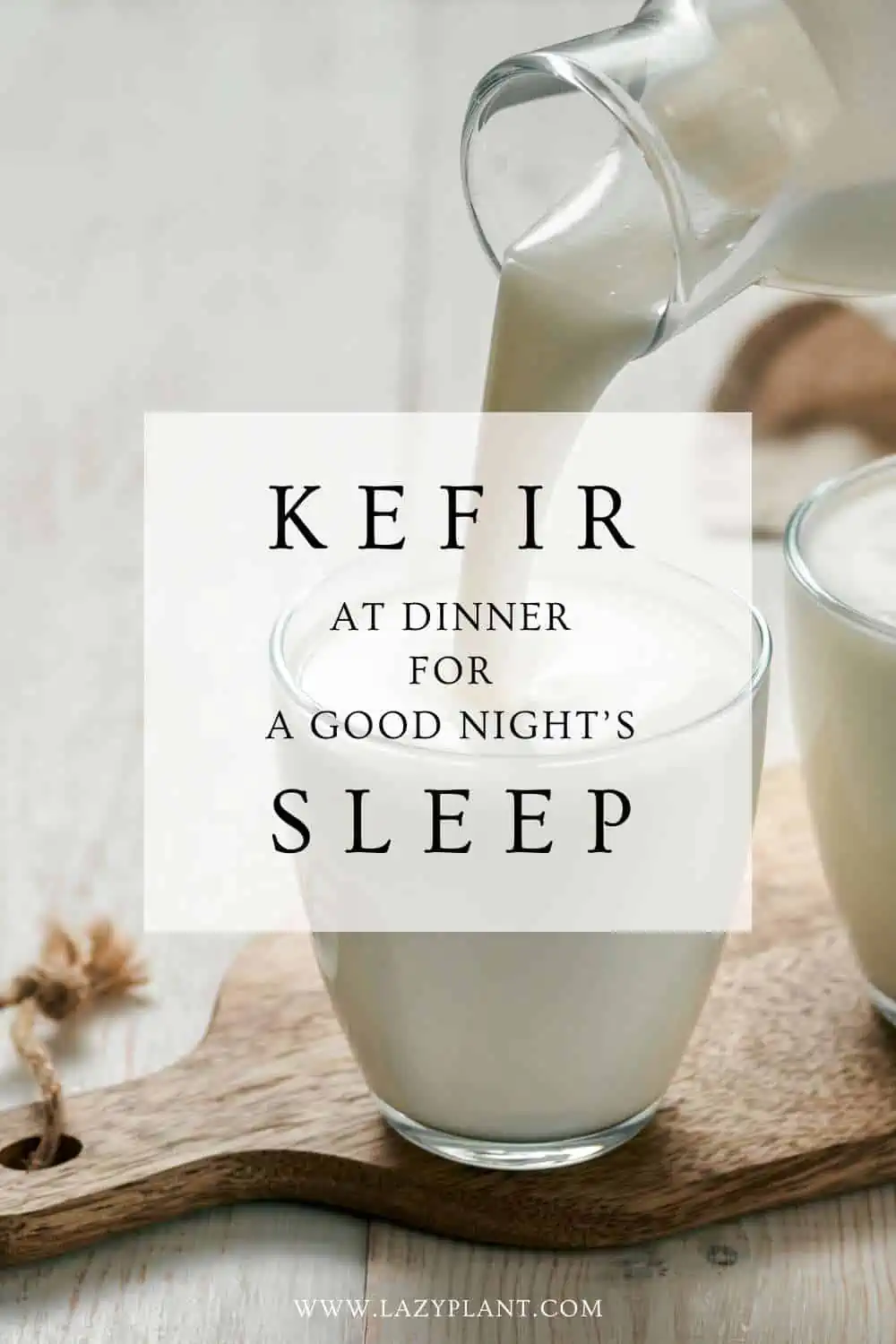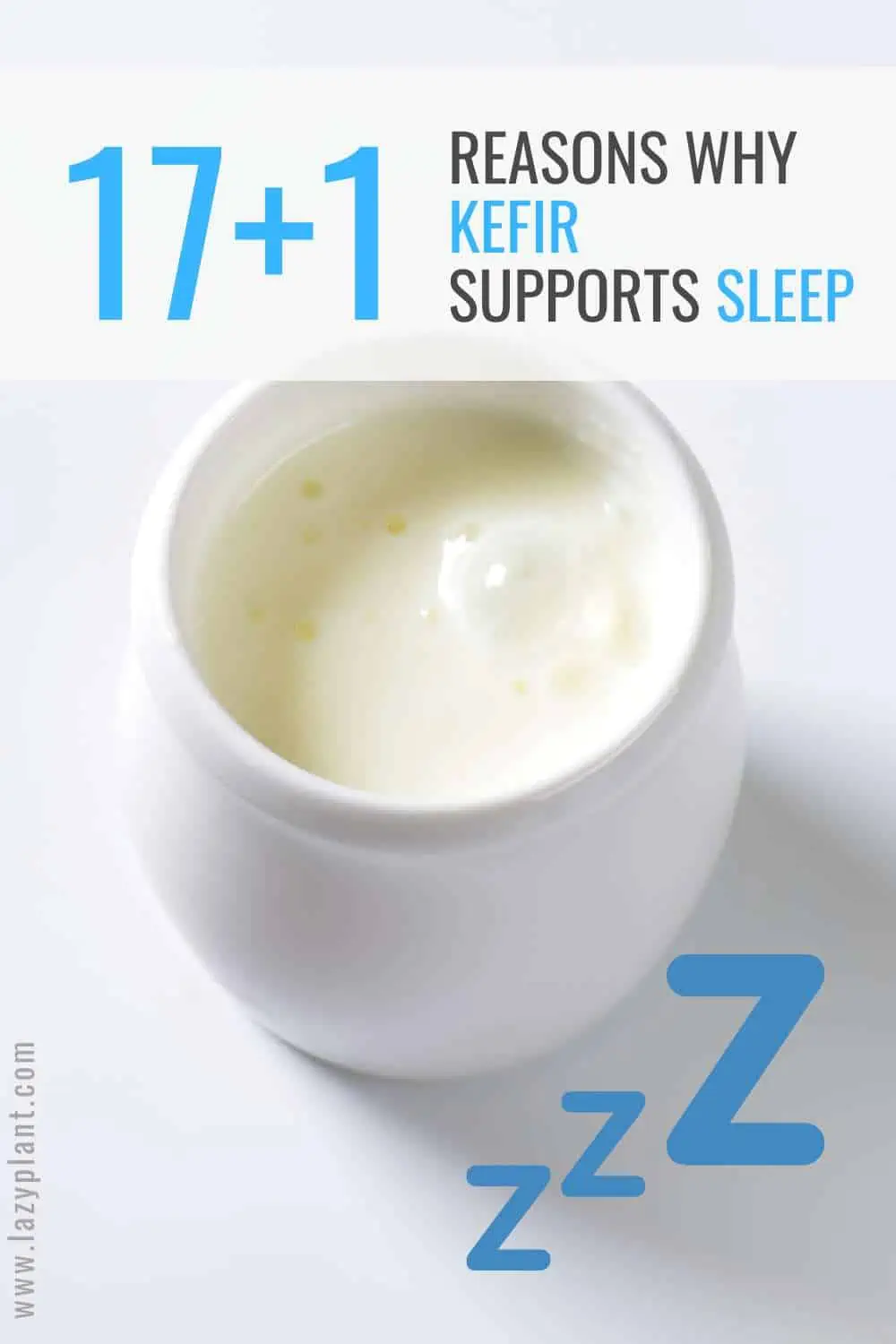Kefir supports a good night’s sleep and may treat insomnia and other sleep disorders because it’s rich in probiotics, protein, vitamins, and minerals that:
- stimulate the synthesis of melatonin and serotonin
- reduce stress
- relax the muscles
- promote a healthy gut microbiota
What’s kefir?
Kefir is fermented milk. Kefir grains are added to cow’s milk. These are a mix of beneficial bacteria and yeast.
Kefir is the richest common food in probiotics. Most commercial kefir products have 10-12 active probiotic strains.
Probiotics support a healthy gut microbiota. They enhance divergence and increase the population of beneficial bacteria.
A healthy, well-balanced gut microbiota is beneficial for good health, increased immunity, weight loss, as well as a good night’s sleep!
Furthermore, drinking kefir at dinner is good for you because it’s packed with vitamins and minerals that relax the muscles, relieve anxiety, and reduce stress!
The key role of a healthy gut microbiota to sleep
Firstly, kefir supports a good night’s sleep because it promotes healthy gut microbiota.
Gut microbiota is connected to the brain functions. It’s a two-way pathway:
- Stress, anxiety, or sleep deprivation can have detrimental effects on gut health.
- Unbalanced gut microbiota can cause depression, bad mood, and sleeping problems!
This two-way communication is known as the brain-gut-microbiome axis.
Treating unbalanced gut microbiota could have a beneficial effect on sleep disorders. It regulates sleep behavior both directly and indirectly.[1,2]
Stress, certain diseases, drugs, aging, or poor diet can have negative effects on the diversity, population, and proper functions of bacteria in the gut.
As kefir helps improve gut health, it may have positive effects on sleep disturbances, depression, immunity, weight loss, and quality of life.[3,4]
For instance, healthy gut microbiota can modulate cortisol; the stress-related hormone. Hence, kefir may reduce anxiety.[5]
Moreover, the gut microbiome regulates the production of serotonin and other hormones that are implicated in sleep quality, duration, and onset latency![6]
When do I need probiotic supplements?
As short duration and poor quality of sleep are associated with unbalanced gut microbiota, it’s good for you to eat foods rich in probiotics, like kefir, at dinner.
But, in certain cases (e.g. disease, poor diet, use of antibiotics), the intake of probiotic supplements may be mandatory. In fact, probiotic supplementation has been found to improve sleep quality.[7]
You can find a wide variety of probiotic supplements at unbeatable prices on iHerb.
Following a fiber-rich diet is also crucial for having healthy gut microbiota. The richest foods in fiber are vegetables, fruits, beans, and whole grains.
Sleep hormones
Kefir also supports a good night’s sleep because it modulates serotonin and melatonin production.
Tryptophan
Firstly, kefir is rich in tryptophan. It contains about 70 mg of tryptophan per 100g, or 168 mg per serving.[8]
This amino acid is the precursor of serotonin.
Moreover, tryptophan has a relaxing effect on the nervous system.
Serotonin
Serotonin is a neurotransmitter that affects various functions in the body, including mood, appetite, and sleep. It is produced from the amino acid tryptophan.
Serotonin helps regulate the sleep-wake cycle and mood by influencing the activity of certain brain regions.

95% of the body’s serotonin is produced in the intestine! That’s another key reason why eating foods rich in probiotics and fiber is vital for a good mood, reduces stress, and supports a good night’s sleep![9]
We can naturally increase our serotonin status by following certain simple diet tips.
Melatonin
Serotonin serves as a precursor to melatonin.
Melatonin is a hormone produced by the body. It is often referred to as the “sleep hormone” because it plays a key role in regulating sleep patterns.
We can skyrocket our melatonin levels by consuming various foods rich in melatonin. Try to incorporate them into your dinner.
Additionally, a high melatonin intake from food may help protect the gut from inflammation and enhance its immunity.[10]
Both melatonin and serotonin promote weight loss.
GABA
Also, gut microflora regulates the synthesis of GABA; another key neurotransmitter that has beneficial effects on anxiety, stress, insomnia, and weight loss.[11]
Vitamins & minerals
In addition, it’s good for you to drink kefir before bed because it’s packed with various nutrients that support a good night’s sleep and help burn body fat during the night.
Vitamin A
Kefir is an excellent dietary source of vitamin A. Just a cup provides 46% of the Daily Value![12]
Low vitamin A intake may cause disturbed wake-sleep cycles. Vitamin A deficiency appears to have detrimental effects on slow-wave sleep, in particular.[13]
The main sources of vitamin A for most people are eggs, dairy products, and fish. However, we can get high doses from a plant-based diet as well.
Calcium
Kefir is also particularly rich in calcium. A serving provides 32% of the Daily Value!
Calcium also modulates sleep. It regulates slow-wave sleep generation, in particular. Reduced calcium intake has been associated with an increased risk of insomnia![14]

Vitamin B12
A serving of kefir provides 29% of the recommended daily intake of vitamin B12. It’s one of the richest foods in this key B vitamin!
Vitamin B12 has beneficial effects on sleep because it’s implicated in the production of serotonin and melatonin.
Actually, high vitamin B12 concentrations are associated with better sleep quality and lower use of sleep medication.[15]
But, vitamin B12 deficiency is pretty common, as it’s naturally present only in foods of animal origin, like dairy products, eggs, fish, and meat. Common plant-based foods don’t contain any vitamin B12.
Other B vitamins
Moreover, a cup of kefir is rich in riboflavin (25% DV), pantothenic acid (19% DV), vitamin B6 (11% DV), folate (8% DV), and thiamine (6% DV).
These B vitamins support a good night’s sleep, as they’re necessary for the synthesis of serotonin. Also, they may:
- influence the reduction of night awakenings
- be beneficial in mild-to-moderate insomnia
- improve overall sleep quality
Severe deficiencies in B vitamins may play a role in obstructive sleep apnea, insomnia, oversleeping, or other sleep disturbances.
Vitamin D
Furthermore, a cup of kefir provides approximately 16% of the Daily Value of vitamin D.
Vitamin D appears to play a beneficial role in sleep.
Among others, vitamin D is implicated in various neurochemical mechanisms involved in sleep regulation. Vitamin D also affects the production and the proper function of melatonin, serotonin, and dopamine.
These hormones control sleep cycles, sleep duration, and sleep onset latency.
Melatonin, in particular, is a crucial component for the regulation of human circadian rhythm.
Plain yogurt as well as plant-based foods are poor sources of vitamin D. Only, eggs and fish contain decent amounts.
Magnesium
Kefir is an excellent dietary source of magnesium as well. A serving provides 7% of the DV.
Normal magnesium status may reduce daytime falling asleep, sleepiness, or snoring!
Magnesium improves overall sleep quality and sleep duration. People with insomnia should be particularly mindful of consuming magnesium. Treating magnesium deficiency may improve sleep onset latency and sleep efficiency.[16]
High magnesium intake may also increase serum melatonin levels!

In addition, magnesium relaxes the muscles. It significantly reduces muscle soreness. Also, it may prevent migraine headaches.
Pumpkin seeds are the richest food in magnesium, with 550 mg per 100g. Other seeds and nuts, as well as oats and beans, are great dietary sources of magnesium as well.
Eggs, meat, and other dairy products also contribute to the daily intake.
Phosphorus
Kefir is one of the richest foods in phosphorus. A serving provides 37% of the DV.
Having normal levels of phosphorus is important for a good night’s sleep. It modulates circadian rhythm, sleep latency, and reduction of sleep pills.[17]
Selenium
Kefir is rich in selenium, providing 16% of the DV per serving.
A high selenium diet may promote optimal sleep time.[18]
Moreover, selenium may prevent memory impairment due to chronic sleep deprivation. It’s a main component of several antioxidant enzymes, having potent neuroprotective effects. That’s why it also supports weight loss!
The richest food in selenium is Brazil nuts. Just a Brazil nut provides more selenium than the DV.
Zinc
Also, kefir is rich in zinc, providing 10% of the DV per cup. Normal zinc levels are necessary for better sleep quality and sleep latency.[19]
Choline
A cup of kefir provides 7% of the DV of choline. Low levels of choline may cause sleepiness during the daytime.
In fact, healthy levels of choline may improve certain brain functions, due to sleep deprivation. It may improve memory.
Protein
Last, but not least, kefir is rich in protein. A serving provides 9 grams of protein. A protein-rich dinner promotes better sleep quality.
Can kefir treat insomnia?
Kefir can have beneficial effects on mild-to-moderate insomnia. Calcium, magnesium, and vitamins of the B complex in kefir play a key role in treating insomnia. Especially to people with nutritional deficiencies.
Also, unbalanced gut microbiota (known as dysbiosis) can lead to an increased risk of insomnia! As probiotics in kefir have a huge beneficial effect on gut health, kefir, as part of a healthy diet, may treat insomnia. Moderate exercise also helps.
Maintaining a normal body weight supports sleep
Additionally, drinking kefir enhances weight loss! It helps burn belly fat, increase metabolism, and reduce hunger! Thus, incorporating kefir into your dinner routine supports a normal body weight.
A lean body substantially reduces the risk of insomnia or poor sleep quality!
When drinking kefir before bed is bad for sleep & weight loss?
Not all people are supposed to drink kefir before bed, though. In certain cases, like allergies, autoimmune conditions, poor immunity, medication, and lactose intolerance, people should consult their healthcare provider before drinking kefir at night.

How much kefir can I drink before bed?
As a rule of thumb, healthy people who follow a fiber-rich diet could drink a cup of kefir before bed.
If you have a sensitive stomach or experience stomach disturbance, you could start drinking smaller portion sizes. Half a cup or even 1/4 cup could be the best amount for you.
You could gradually increase your daily intake.
Individuals with increased energy needs, such as athletes or active people, could drink much higher amounts of kefir daily. But, it’s preferable to consume it during the day.
For instance, you could add kefir to your breakfast cereals. Combining kefir with whole grains is good for your gut health and enhances satiety!
According to a recent study, women who consumed one cup of kefir twice a day had decreased symptoms of insomnia in just a month![20]
How much time before bed can I drink kefir?
As a rule of thumb, you should avoid eating anything a couple of hours before bed. Late-night snacking increases the risk of obesity by up to 5 times! Also, consuming certain foods before bed can affect sleep onset latency and sleep quality.
So, it’s preferable to drink kefir at dinner, which should be at least two hours before bedtime.
How to consume kefir at night for better sleep & weight loss?
For a better sleep, you should drink kefir at dinner with foods rich in melatonin, tryptophan, magnesium, or fiber:
- fruit salads, with strawberries, cranberries, cherries, or bananas are packed with melatonin, fiber, and antioxidant compounds that fight oxidative stress.
- a turkey sandwich is high in tryptophan, iron, and protein.
- a peanut butter & jelly sandwich is high in tryptophan as well as magnesium, fiber, and selenium.
How to incorporate kefir into my diet?
If you don’t like the taste of kefir, you could add it to soups or smoothies instead of milk. Also, it tastes great with oatmeal, granola, or muesli.
Moreover, you could drink flavored kefir. It’s the healthiest beverage to satisfy your sweet tooth.
Is kefir better than milk or yogurt for dinner?
Low-fat plain Greek yogurt is also an excellent food to eat at dinner that supports weight loss and a good night’s sleep. Greek yogurt is also packed with dozens of beneficial nutrients.
However, yogurt typically contains only a few specific strains of probiotics. Only two strains are required for yogurt fermentation (Lactobacillus bulgaricus and Streptococcus thermophilus).
Some yogurt brands may also add 2-3 additional probiotic strains for added health benefits. In most cases, yogurts have only 2-5 probiotic strains.

On the contrary, kefir typically has 3 times more probiotic strains than yogurt. Kefir contains 10-15 probiotic strains.
Check the product label for specific details on the probiotic strains present in these dairy products, as they can vary widely.
Other common dairy products don’t contain probiotics. For instance, most traditional cheeses do not contain live probiotic bacteria because the aging and fermentation process involved in cheese production usually eliminates them.
However, eating cottage cheese at dinner is good for weight loss and sleep!
Is dinner the best time of the day to drink kefir?
Actually, no. You can drink kefir whenever it fits into your daily routine. You can enjoy kefir at breakfast, brunch, or as a post-workout snack!
Always consult your healthcare provider before changing your diet or taking any dietary supplement.